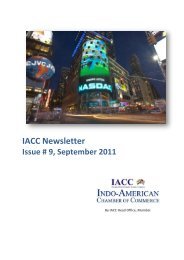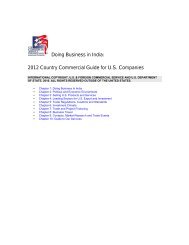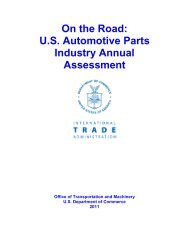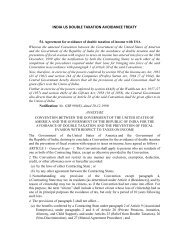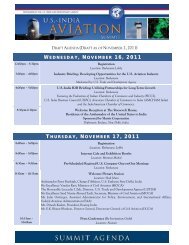Importing into the United States - Indo-American Chamber Of ...
Importing into the United States - Indo-American Chamber Of ...
Importing into the United States - Indo-American Chamber Of ...
You also want an ePaper? Increase the reach of your titles
YUMPU automatically turns print PDFs into web optimized ePapers that Google loves.
and Policy (HFC-170), 5600 Fishers Lane,<br />
Rockville, MD 20857, under <strong>the</strong> Federal Food,<br />
Drug and Cosmetic Act.<br />
3. Insects. Insects in a live state which are injurious<br />
to cultivated crops (including vegetables,<br />
field crops, bush fruit, and orchard, forest, or<br />
shade trees) and <strong>the</strong> eggs, pupae, or larvae of<br />
such insects are prohibited importation, except<br />
for scientific purposes, under regulations prescribed<br />
by <strong>the</strong> Secretary of Agriculture.<br />
All packages containing live insects or<br />
<strong>the</strong>ir eggs, pupae, or larvae, which are not<br />
injurious to crops or trees, are permitted entry<br />
<strong>into</strong> <strong>the</strong> <strong>United</strong> <strong>States</strong> only if covered by a<br />
permit issued by <strong>the</strong> Animal and Plant Health<br />
Inspection Service of <strong>the</strong> Department of Agriculture<br />
and are not prohibited by <strong>the</strong> U.S. Fish<br />
and Wildlife Service.<br />
4. Livestock and Animals. Inspection and<br />
quarantine requirements of <strong>the</strong> Animal and<br />
Plant Health Inspection Service (APHIS) must<br />
be met for <strong>the</strong> importation of (1) all clovenhoofed<br />
animals (ruminants), such as cattle,<br />
sheep, deer, antelope, camels, giraffes; (2) swine<br />
including <strong>the</strong> various varieties of wild hogs<br />
and <strong>the</strong> meat from such animals; (3) horses,<br />
asses, mules, and zebras; (4) all avian species<br />
including poultry and pet birds; (5) animal byproducts,<br />
such as untanned hides, wool, hair,<br />
bones, bone meal, blood meal, animal casings,<br />
glands, organs, extracts, or secretions of ruminants<br />
and swine (if animal by-products for<br />
food, drugs, or cosmetics, <strong>the</strong>y are also regulated<br />
by <strong>the</strong> Food and Drug Administration);<br />
(6) animal germ-plasm, including embryos and<br />
semen; and (7) hay and straw. A permit for<br />
importation must be obtained from APHIS<br />
before shipping from <strong>the</strong> country of origin.<br />
In addition, all animal imports must be<br />
accompanied by a veterinary health certificate.<br />
Entry procedures for livestock and animals<br />
from Mexico and Canada (except for birds from<br />
Mexico) are not as rigorous as those for animals<br />
from o<strong>the</strong>r countries. Entry of animals is<br />
restricted to certain ports that have been designated<br />
as quarantine stations. All nondomesticated<br />
animals must meet <strong>the</strong> requirements of<br />
<strong>the</strong> Fish and Wildlife Service.<br />
5. Meat and Meat Products. All commercial<br />
shipments of meat and meat food products<br />
(derived from cattle, sheep, swine, goats, and<br />
horses) offered for entry <strong>into</strong> <strong>the</strong> <strong>United</strong> <strong>States</strong><br />
are subject to <strong>the</strong> regulations of <strong>the</strong> Department<br />
of Agriculture and must be inspected by <strong>the</strong><br />
Animal and Plant Health Inspection Service<br />
and <strong>the</strong> Food Safety and Inspection Service of<br />
that department prior to release by U.S. Customs.<br />
Meat products from o<strong>the</strong>r sources<br />
(including, but not limited to wild game) are<br />
subject to APHIS regulations; <strong>the</strong> provisions of<br />
<strong>the</strong> Federal Food, Drug, and Cosmetic Act,<br />
enforced by <strong>the</strong> Food and Drug Administration;<br />
and <strong>the</strong> U.S. Fish and Wildlife Service.<br />
6. Plant and Plant Products. The importation of<br />
plants and plant products is subject to regulations<br />
of <strong>the</strong> Department of Agriculture and<br />
may be restricted or prohibited. Plants and<br />
plant products include fruits, vegetables,<br />
plants, nursery stock, bulbs, roots, seeds, certain<br />
fibers including cotton and broomcorn, cut<br />
flowers, sugarcane, certain cereals, elm logs,<br />
and elm lumber with bark attached. Import<br />
permits are required. Fur<strong>the</strong>r information<br />
should be obtained from APHIS. Also, certain<br />
endangered species of plants may be prohibited<br />
or require permits or certificates. The Food<br />
and Drug Administration also regulates plant<br />
and plant products, particularly fruits and vegetables.<br />
7. Poultry and Poultry Products. Poultry, live,<br />
dressed, or canned; eggs, including eggs for<br />
hatching; and egg products are subject to <strong>the</strong><br />
requirements and regulations of <strong>the</strong> Animal<br />
and Plant Heath Inspection Service and <strong>the</strong><br />
Food Safety and Inspection Service of <strong>the</strong><br />
Department of Agriculture.<br />
Except for live poultry and poultry products<br />
entering through land ports from Canada,<br />
permits are required, as well as special marking<br />
and labeling; and in some cases, foreign inspection<br />
certification. The term “poultry” is defined<br />
as any live or slaughtered domesticated bird,<br />
e.g., chickens, turkeys, ducks, geese, swans,<br />
partridges, guinea fowl, pea fowl, non-migratory<br />
ducks, pigeons, and doves. O<strong>the</strong>r birds<br />
(e.g., commercial, domestic, or pen-raised<br />
grouse, pheasants and quail, and migratory<br />
birds) as well as certain egg products are subject<br />
to APHIS regulations and to <strong>the</strong> provisions<br />
of <strong>the</strong> Federal Food, Drug, and Cosmetic Act,<br />
72 U.S. CUSTOMS SERVICE







